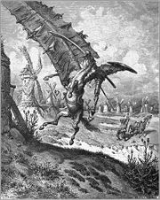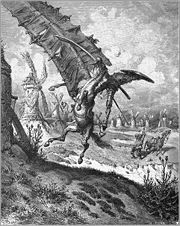
Tilting at windmills
Encyclopedia

Idiom
Idiom is an expression, word, or phrase that has a figurative meaning that is comprehended in regard to a common use of that expression that is separate from the literal meaning or definition of the words of which it is made...
which means attacking imaginary enemies, or fighting unwinnable or futile battles. The word “tilt”, in this context, comes from jousting
Jousting
Jousting is a martial game or hastilude between two knights mounted on horses and using lances, often as part of a tournament.Jousting emerged in the High Middle Ages based on the military use of the lance by heavy cavalry. The first camels tournament was staged in 1066, but jousting itself did not...
.
The phrase is sometimes used to describe confrontations where adversaries are incorrectly perceived, or courses of action that are based on misinterpreted or misapplied heroic, romantic, or idealistic justifications.
Etymology
The phrase derives from an episode in the novel Don Quixote by Miguel de CervantesMiguel de Cervantes
Miguel de Cervantes Saavedra was a Spanish novelist, poet, and playwright. His magnum opus, Don Quixote, considered the first modern novel, is a classic of Western literature, and is regarded amongst the best works of fiction ever written...
. In the novel, Don Quixote fights windmill
Windmill
A windmill is a machine which converts the energy of wind into rotational energy by means of vanes called sails or blades. Originally windmills were developed for milling grain for food production. In the course of history the windmill was adapted to many other industrial uses. An important...
s that he imagines to be giants
Giant (mythology)
The mythology and legends of many different cultures include monsters of human appearance but prodigious size and strength. "Giant" is the English word commonly used for such beings, derived from one of the most famed examples: the gigantes of Greek mythology.In various Indo-European mythologies,...
. Quixote sees the windmill blades as the giant's arms, for instance. A relevant portion of the novel states:
Historical context
Cervantes wrote Don Quixote in two parts, published respectively in 1605 and 1615, during the latter part of a historical period known as the Spanish Golden AgeSpanish Golden Age
The Spanish Golden Age is a period of flourishing in arts and literature in Spain, coinciding with the political rise and decline of the Spanish Habsburg dynasty. El Siglo de Oro does not imply precise dates and is usually considered to have lasted longer than an actual century...
. During this age, Spain pursued military conquests in parts of Europe and conquered large parts of the Americas, which brought great riches to the country and inspired a flowering of the arts. In La Mancha, Castilla, there are still some of the old windmills that Don Quixote found in his adventures.
Cervantes wrote and published Don Quixote during the Eighty Years' War, or Dutch War of Independence (1568–1648), a revolt by the Habsburg Netherlands
Habsburg Netherlands
The Habsburg Netherlands was a geo-political entity covering the whole of the Low Countries from 1482 to 1556/1581 and solely the Southern Netherlands from 1581 to 1794...
to end Spanish rule. In Don Quixote, the eponymous protagonist consistently misinterprets his own, his adversaries', and his allies' actions and motives - regularly resulting in apparently unjustified violent actions and consequences. One way of interpreting Don Quixote's tilting at windmills could be as an allegory to promote critical, skeptical, or satirical evaluation of either a hero's motives, rationales and actions, or a nation's foreign policies.
Popular culture
- The scene with the windmills is included in both the stage and film versions of Man of La ManchaMan of La ManchaMan of La Mancha is a musical with a book by Dale Wasserman, lyrics by Joe Darion and music by Mitch Leigh. It is adapted from Wasserman's non-musical 1959 teleplay I, Don Quixote, which was in turn inspired by Miguel de Cervantes's seventeenth century masterpiece Don Quixote...
, the hit musical play inspired by Don Quixote.
- The Toad the Wet SprocketToad the Wet SprocketToad the Wet Sprocket is an American alternative rock band formed in 1986. The band consists of singer/guitarist Glen Phillips, guitarist Todd Nichols, bassist Dean Dinning, and drummer Randy Guss. The band enjoyed chart success in the 1990s with the singles "Walk on the Ocean," "All I Want,"...
song, "Windmills", from the album DulcineaDulcinea (album)Dulcinea is an album by Toad the Wet Sprocket released in 1994. It is their fourth studio album with Columbia Records and the follow-up to their popular album fear, which was released in 1991. Two songs from Dulcinea reached Top 40 designation on the Modern Rock and Mainstream Rock charts: "Fall...
alludes to quixotismQuixotismQuixotism is impracticality in pursuit of ideals, especially those ideals manifested by rash, lofty and romantic ideas or extravagantly chivalrous action. It also serves to describe an idealism without regard to practicality...
. (And the album name itself is an allusion to Don Quixote's love interest, Dulcinea del TobosoDulcinea"Dulcinea del Toboso" is a fictional character who is referred to in Miguel de Cervantes' novel Don Quixote. Seeking the traditions of the knights-errant of old, Don Quixote finds a true love whom he calls Dulcinea. She is a simple peasant in his home town, but Quixote imagines her to be the most...
.)
- Canadian singer/songwriter Gordon LightfootGordon LightfootGordon Meredith Lightfoot, Jr. is a Canadian singer-songwriter who achieved international success in folk, folk-rock, and country music, and has been credited for helping define the folk-pop sound of the 1960s and 1970s...
paid homage to this phrase in the opening lines of his 1972 song Don Quixote (from the album of the same nameDon Quixote (album)Don Quixote is Canadian singer Gordon Lightfoot's 8th original album, released in 1972 on the Reprise Records Label. The album reached #42 on the Billboard album chart....
):
Through the woodland, through the valley
Comes a horseman wild and free
Tilting at the Windmills passing
Who can this brave young horseman be?
- The band name of They Might Be GiantsThey Might Be GiantsThey Might Be Giants is an American alternative rock band formed in 1982 by John Flansburgh and John Linnell. During TMBG's early years Flansburgh and Linnell were frequently accompanied by a drum machine. In the early 1990s, TMBG became a full band. Currently, the members of TMBG are...
(who are named after a 1971 movieThey Might Be Giants (film)They Might Be Giants is a 1971 film based on the play of the same name starring George C. Scott and Joanne Woodward. Occasionally cited mistakenly as a Broadway play, it never in fact opened in the USA...
of the same name) is a reference to Don Quixote thinking the windmills are giants.
- Dark Moor's song "Tilt At Windmills" from their release "Ancestral Romance" is a tribute to Don Quixote.
- Singer Songwriter Dave Carter mentions "tilting at windmills" in his song "Lancelot" on the album "When I Go".
So Bugles blow golden and banners fly blue,
but these days the castle's just drywall and glue,
and tilting at windmills is the best you can do,
with the black knight of time on your lawn
- The band Moldy Peaches states "Don Quixote is a steel-drivin' man" in their song "Anyone Else But You," made popular by the "Juno" soundtrack.
- In the video game, Alice: Madness ReturnsAlice: Madness ReturnsAlice: Madness Returns is a video game for Microsoft Windows, PlayStation 3, and Xbox 360 released on June 14, 2011, in North America, June 16, 2011, in Europe and June 17, 2011, in the United Kingdom. It is the sequel to the 2000 Windows and Mac video game American McGee's Alice...
, while fighting a giant, indestructible enemy armed with a scytheScytheA scythe is an agricultural hand tool for mowing grass, or reaping crops. It was largely replaced by horse-drawn and then tractor machinery, but is still used in some areas of Europe and Asia. The Grim Reaper is often depicted carrying or wielding a scythe...
, Alice quips, "I'm an idiot. Don Quixote had a better chance with his windmills. And with slightly less chance of decapitationDecapitationDecapitation is the separation of the head from the body. Beheading typically refers to the act of intentional decapitation, e.g., as a means of murder or execution; it may be accomplished, for example, with an axe, sword, knife, wire, or by other more sophisticated means such as a guillotine...
."

